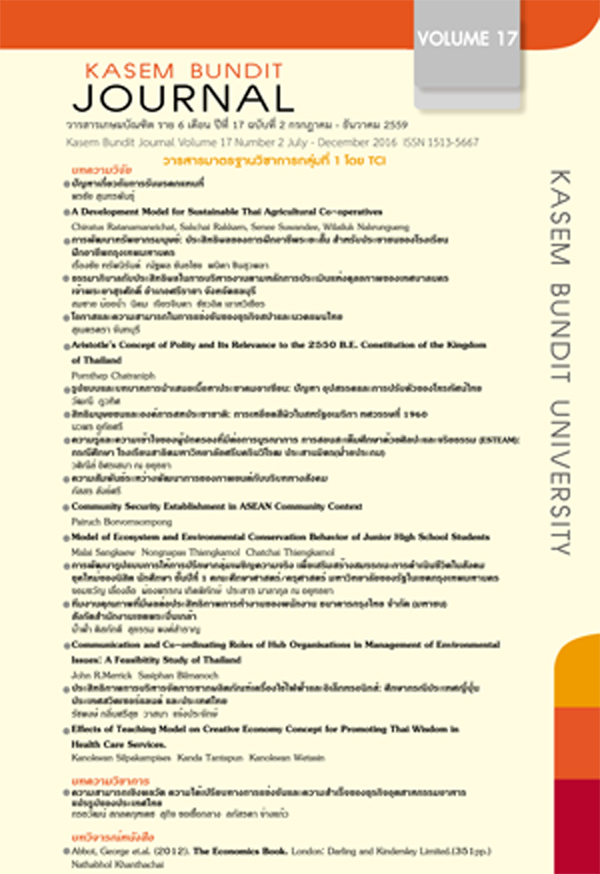ประสิทธิภาพการบริหารจัดการซากผลิตภัณฑ์เครื่องใช้ไฟฟ้าและอิเล็กทรอนิกส์: ศึกษากรณีประเทศญี่ปุ่น ประเทศสวิตเซอร์แลนด์ และประเทศไทย
Keywords:
ซากผลิตภัณฑ์เครื่องใช้ไฟฟ้าและอิเล็กทรอนิกส์ หรือขยะอิเล็กทรอนิกส์ การวิเคราะห์นโยบาย ผู้คัดแยกนอกระบบ, Waste from Electrical and Electronic Equipment, Electronic waste, Policy Analysis, Informal SectorAbstract
บทคัดย่อ
บทความนี้ มีวัตถุประสงค์เพื่อวิเคราะห์เปรียบเทียบนโยบาย มาตรการ และแนวปฏิบัติของประเทศญี่ปุ่น ประเทศสวิตเซอร์แลนด์ และประเทศไทย ใช้เกณฑ์วิเคราะห์ด้านกรอบโครงสร้าง ระบบการจัดการ และผลกระทบ ผลการวิเคราะห์พบว่านโยบาย มาตรการ และแนวปฏิบัติในการจัดการซากผลิตภัณฑ์ฯ ของประเทศญี่ปุ่น ประเทศสวิตเซอร์แลนด์และประเทศไทย มีวัตถุประสงค์ในการลดผลกระทบต่อสุขภาพ สิ่งแวดล้อม และสร้างมูลค่าเพิ่มจากองค์ประกอบของซากผลิตภัณฑ์ฯ โดยการนำกลับมาใช้ซ้ำและแปรรูปเพื่อใช้ใหม่ นโยบายการจัดการซากผลิตภัณฑ์ฯ ของประเทศญี่ปุ่นประสบความสำเร็จ เนื่องจากมีกรอบโครงสร้างของกฎหมายเฉพาะด้านในการจัดการซากผลิตภัณฑ์ฯ ที่ชัดเจน และมีการบังคับใช้กฎหมายที่ดี รวมทั้งระบบโครงสร้างพื้นฐานในการจัดการที่ครบวงจร เช่นเดียวกับประเทศสวิตเซอร์แลนด์ ที่มีกฎหมายในการจัดการซากผลิตภัณฑ์ฯ กำหนดหน้าที่ความรับผิดชอบของผู้เกี่ยวข้องอย่างชัดเจน และมีองค์กรที่เป็นความร่วมมือของภาคอุตสาหกรรม ดำเนินการเก็บรวบรวม ขนส่ง และควบคุมคุณภาพการจัดการซากผลิตภัณฑ์ฯ ซึ่งแตกต่างกับประเทศไทย ที่ไม่มีกฎหมายเฉพาะด้านในการจัดการซากผลิตภัณฑ์ฯ แต่มีการกำหนดยุทธศาสตร์ในการจัดการซากผลิตภัณฑ์และยกร่างกฎหมายเฉพาะด้านที่กำหนดหน้าที่ของผู้เกี่ยวข้อง ที่มีกลุ่มผู้คัดแยกนอกระบบ (Informal sector) ที่มีบทบาทสำคัญในการจัดการซาก ผลิตภัณฑ์ฯ การกำหนดนโยบาย มาตรการและแนวปฏิบัติ จะต้องครอบคลุมการดำเนินงานของกลุ่มผู้คัดแยกนอกระบบ โดยการสร้างแรงจูงใจให้ผลประโยชน์กับกลุ่มผู้คัดแยกนอกระบบ ให้เข้ามามีส่วนร่วมในการจัดการซากผลิตภัณฑ์ฯ ให้มีประสิทธิภาพและเกิดความยั่งยืนต่อระบบการจัดการซากผลิตภัณฑ์ต่อไป
Abstract
The objective of this article is to analyze the difference of policies, measures and practices for electronic waste management in Japan, Switzerland and Thailand. It is reviewed and analyzed under the three important criteria including structure framework, management system and impact from electronic waste management. The result shows that the policies for electronic waste management in those countries aimed to minimize the impact on health and the environment by reuse and recycling. In Japan, electronic waste management is successful because of the specific legal framework of electronic waste management and strong enforcement including integrated infrastructure for electronic waste management. As same as Switzerland, there are the specified law of electronic waste management which clearly defined duties and responsibilities of those involved. The organization for collecting, transporting and management is a partnership with the industry sector in Thailand, on the other hand, there is no specific law for electronic waste management. Informal sector was found to be key element on electronic waste management as a mechanism for recycling and related activities. In conclusion, policies and measures for electronic waste management in Thailand should be based on the context of socio-economic conditions of the country, and the informal sector should be integrated into the management system for effectiveness and sustainable electronic waste management.
Downloads
Published
How to Cite
Issue
Section
License
ทัศนคติ ความคิดเห็นใด ๆ ที่ปรากฏในวารสารเกษมบัณฑิตฉบับนี้เป็นของผู้เขียน โดยเฉพาะ มหาวิทยาลัยเกษมบัณฑิตและบรรณาธิการ ไม่จำเป็นต้องมีความเห็นพ้องด้วย







